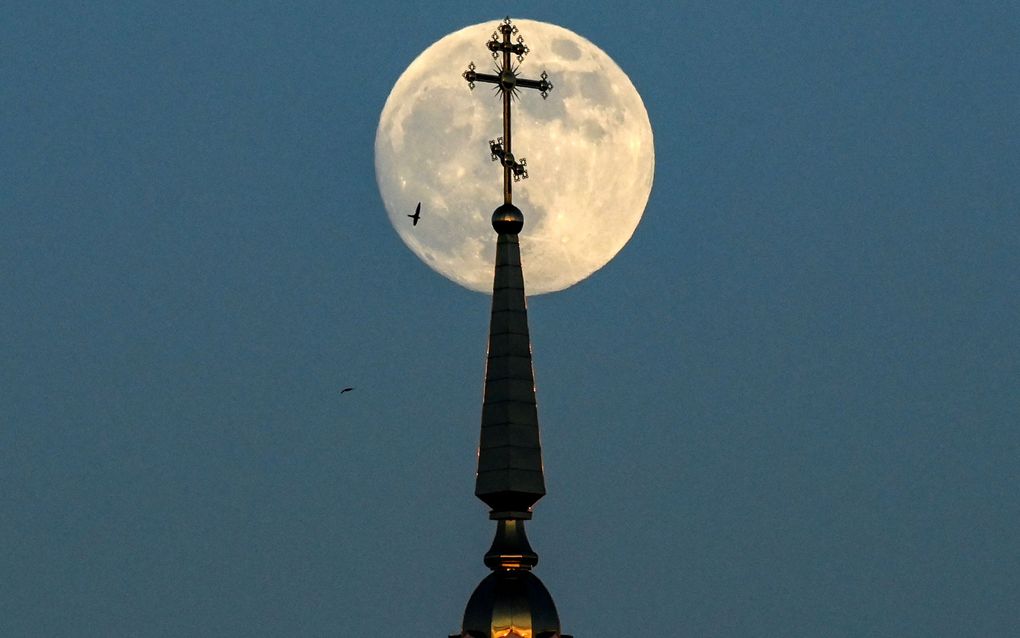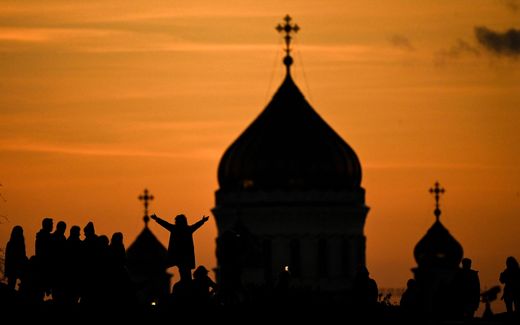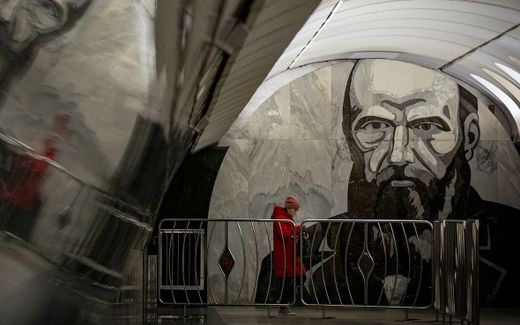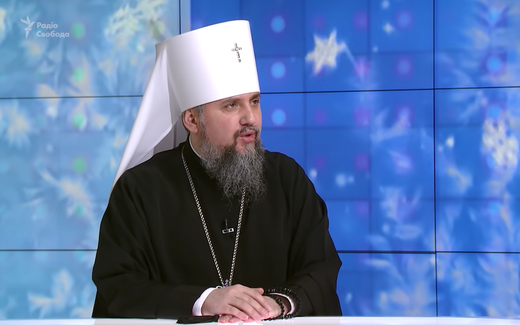Russia on US blacklist must be mistake, says Orthodox leader
27-12-2021
Eastern Europe
RD

The full moon is pictured behind a cross on top of an Orthodox church in the city of Rossosh', Voronezh region. Photo AFP, Kirill Kudryavtsev
Eastern Europe
Russia has been put on the US State Department’s blacklist of countries where religious freedom is “seriously” at risk. The Russians accuse the US of a “political move”.
“Baptists, Adventists and Evangelicals are all guilty of destroying the spiritual unity of the Russian people. Therefore, they should be banned.”
That statement was made by an FSB agent in the southern Russian region of Krasnodar. The security service, formerly known as the KGB, harshly disrupted a Sunday service of a church community in the city of Novorossisk, where they offended churchgoers.
The local Baptists, although registered, have no building of their own and therefore meet in a home. According to the FSB, that goes against the Yarovaya-law, a package of laws officially meant to combat extremism but frequently used to bully believers.
Free world
The story of Novorossisk illustrates how Christian non-Orthodox denominations face increased pressure in Russia. It is, therefore, no surprise that the US State Department placed Russia on its ‘blacklist’ of countries where religious freedom is ‘seriously’ under threat. Other countries on the list are Iran, North Korea, Eritrea, and Pakistan.
Yet, in Russia itself, people are confused about its placement on the blacklist: even the persecuted themselves see that Christians in the other countries on the list have to deal with severely worse conditions than in Russia itself. For example, it is strange, to say the least, that Nigeria –a country where dozens of Christians are murdered each year– has been removed from the list, while Russia was put on the list this year by the Biden administration.

Patriarch Kirill (Gundyaev), head of the Orthodox Church, argues that Russia does not belong on the blacklist. On the contrary, in his view, Russia “is the new leader of the free world.”
Kirill made those remarks in an interview on Russian state television in late November, celebrating his 75th birthday. According to the Russian Patriarch, the conclusion of the US government is biased: “We are truly a free country. We are free from the strongest outside influences. We develop in our own way, and may God see that that way proves successful. Russia can be an example for others.”
Politicised
Also, Kremlin itself criticised the Americans. Gennady Askaldovich, top diplomat of the Russian Foreign Ministry, said he was “outraged” at the American Department’s words. He said there are no “blatant violations of religious freedom” in Russia. Askaldovich accused the Biden administration of politicising the subject of “religion” in order to exercise international ambitions and power “while lecturing others”.

“It is astonishing how the United States arbitrarily and blatantly assumes the position of an international referee and decides to run the world’s religious affairs as it sees fit,” the diplomat objected to the decision of the United States Secretary of State, Anthony Blinken.
Sodom
Pavel Merkulov, a leading member of Russia’s unregistered Baptists (MSC ECB), refused to comment on the American decision because “Christ said His Kingdom is not of this world.” He, however, states that such decisions are made “out of political interests” and not “because of compassionate feelings about the discrimination of specific groups.”
Moreover, according to Merkulov, his church should not seek protection from foreign states: “We would become political enemies of our state and our people. How could we then preach the gospel of Christ to our fellow Russians?”
According to Merkulov, it is more important that fellow believers abroad pray for the Russian leaders and the brothers and sisters in faith.
According to Merkulov, there is no large-scale systematic persecution in Russia, in which the government works against churches across the country in a coordinated way. However, there is local persecution. “Spontaneous, sporadic prosecutions dictated by various motives, which flare up randomly in some places.” The events in Arkhangelsk are an example of that (see below).
Surprisingly, Merkulov says he agrees with the patriarch and applauds the current government’s state policies. The patriarch referred to Russia’s traditional family values and the love for the fatherland. He agitated against liberal norms in the West; “the sins of Sodom and many other perversions,” as Merkulov puts it. “Russia’s state policies do not create additional tensions in the society and do not provoke the persecution of believers.”
“We, as a church, are called to be faithful to Christ, regardless of the political system or circumstances, in our calling to preach the gospel to the world,” Merkulov says. He is grateful for prayers and help from abroad with evangelism in Russia. “Let not your zeal weaken,” he quotes Romans 12:11.
Extremism
Jehovah’s Witnesses are the Christian denomination that suffers most from systematic persecution from the Russian state. The Russian judge decided in 2017 to ban the movement under the pretext of “extremism” —the result: in four years, 44 sentences to prison terms, 88 suspended sentences and 14 fines. On October 25, four Jehovah’s Witnesses were sentenced in Astrakhan: three of them received eight years of imprisonment in a penal colony. That is the heaviest sentence given to Jehovah’s Witnesses so far.
Pavel Vladimirovich Merkulov was born in 1971 in a Baptist family in the city of Kazan. Father Vladimir Vitalyevich – known as the artist of the illustrations in the trilogy about the life of Nikolai Khrapov – had previously spent several years in prison for defying Soviet power and sharing the gospel on the streets.

Pavel Merkulov found his calling in publishing and writing about the generation living under the yoke of Communism. He is the author of dozens of Christian publications, documentaries and articles. He is the presenter of the website vernost.info with archives and stories about Russian Baptists (unregistered, MSC ECB).
Persecution in Arkhangelsk
Dozens of believers gather outside the court in the northern city of Severodvinsk in the Arkhangelsk region to support their fellow church member, Vyacheslav Koldyaev (27). An old police van –grey with blue stripes, still of the Soviet brand ‘bukhanka’– is ready to take the newly convicted Baptist away. Two years of imprisonment in a penal colony is the judge’s ruling.
When the church members catch a glimpse of Koldyaev, they start singing. The police push him into the van. Tears dangle on the cheeks of the sisters, and the brothers sing with trembling voices. “One family, one heart and one soul” are the words of an old Russian Baptist song. The congregation members throw flowers at Koldyaev, but the van is already speeding away.
Anyone who sees the images would imagine themselves in the Soviet Union, where expressing one’s faith was often punished. Still, nothing could be further from the truth: even in the 21st century, Russian believers are condemned for their faith.
Koldyaev has been a staunch member of the unregistered Baptist church in Arkhangelsk for many years. That church has been at odds with local residents and the authorities since 2016. Their first house of worship burned down (probably lit on purpose) in 2003. After the incident, they built the current building of gas blocks in 2006. The owners of the garage complex, right behind the church building, started interfering with the church in 2016: part of the building would stand on their property. The judge agreed and decided that part of the church had to be demolished.
When Koldyaev stood in a living chain with his brothers on September 20, 2020, to block authorities from entering the building, police said he pushed or pulled one of the government officials. However, video footage does not support that claim. Yet, Koldyaev was convicted under Article 318: the use of health-threatening violence against an official in office.
Sectarians
Koldyaevs wife, Anna, wrote in a letter to the community: “It was not a big shock for us. We understood how the legal process could end. We did not expect a fair trial and justice – there is not and never will be on a sinful earth.”
“From the start, it was clear that the case was based on religious grounds,” says Ekaterina Stepanova, wife of the pastor who lives in the church building with his family. The conversations often featured slogans such as “sectarians”, “American spies”, and even demeaning “chaplains”. Once, someone even said: “The people burned your first house of worship, and now this one must also be demolished; we do not need you in our city”.
Merkulov also sees Koldyaev’s conviction as ‘indirect persecution’: “The peaceful opposition of the local believers to the illegal claims of the bailiffs angered the authorities so much that, in my opinion, they decided to teach the ‘sectarians’ a lesson.” According to Merkulov, the motivation of the judge - who passed his verdict despite overwhelming evidence of Koldyaev’s innocence - is mainly to “punish stubborn sectarians”.
Related Articles





